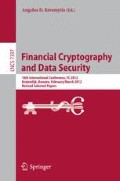Abstract
Secure function evaluation (SFE) on mobile devices, such as smartphones, creates compelling new applications such as privacy-preserving bartering. Generating custom garbled circuits on smartphones, however, is infeasible for all but the most trivial problems due to the high memory overhead incurred. In this paper, we develop a new methodology of generating garbled circuits that is memory-efficient. Using the standard SFDL language for describing secure functions as input, we design a new pseudo-assembly language (PAL) and a template-driven compiler that generates circuits which can be evaluated with Fairplay. We deploy this compiler for Android devices and demonstrate that a large new set of circuits can now be generated on smartphones, with memory overhead for the set intersection problem reduced by 95.6% for the 2-set case. We develop a password vault application to show how runtime generation of circuits can be used in practice. We also show that our circuit generation techniques can be used in conjunction with other SFE optimizations. These results demonstrate the feasibility of generating garbled circuits on mobile devices while maintaining high-level function specification.
Access this chapter
Tax calculation will be finalised at checkout
Purchases are for personal use only
Preview
Unable to display preview. Download preview PDF.
References
Bellare, M., Micali, S.: Non-interactive oblivious transfer and applications. In: Brassard, G. (ed.) CRYPTO 1989. LNCS, vol. 435, pp. 547–557. Springer, Heidelberg (1990)
Ben-David, A., Nisan, N., Pinkas, B.: FairplayMP: a System for Secure Multi-Party Computation. In: 15th ACM Conference on Computer and Communications Security, CCS 2008, pp. 257–266. ACM, New York (2008)
Brickell, J., Shmatikov, V.: Privacy-Preserving Classifier Learning. In: Dingledine, R., Golle, P. (eds.) FC 2009. LNCS, vol. 5628, pp. 128–147. Springer, Heidelberg (2009)
Gartner: Gartner Says Worldwide Mobile Device Sales to End Users Reached 1.6 Billion Units in 2010; Smartphone Sales Grew 72 Percent in 2010 (2011), http://www.gartner.com/it/page.jsp?id=1543014
Henecka, W., Kögl, S., Sadeghi, A.-R., Schneider, T., Wehrenberg, I.: TASTY: Tool for Automating Secure Two-Party Computations. In: Proc. 17th ACM Symposium on Computer and Communications Security, CCS 2010, Chicago, IL (October 2010)
Huang, Y., Chapman, P., Evans, D.: Privacy-Preserving applications on smartphones: Challenges and opportunities. In: Proceedings of the 6th USENIX Workshop on Hot Topics in Security (HotSec 2011) (August 2011)
Huang, Y., Evans, D., Katz, J., Malka, L.: Faster Secure Two-Party Computation Using Garbled Circuits. In: Proceedings of the 20th USENIX Security Symposium, San Francisco, CA (August 2011)
Jha, S., Kruger, L., Shmatikov, V.: Towards Practical Privacy for Genomic Computation. In: Proceedings of the 2008 IEEE Symposium on Security and Privacy, Berkeley, CA, USA, pp. 216–230 (November 2008)
Kolesnikov, V., Schneider, T.: Improved Garbled Circuit: Free XOR Gates and Applications. In: Aceto, L., Damgård, I., Goldberg, L.A., Halldórsson, M.M., Ingólfsdóttir, A., Walukiewicz, I. (eds.) ICALP 2008, Part II. LNCS, vol. 5126, pp. 486–498. Springer, Heidelberg (2008)
Kruger, L., Jha, S., Goh, E.-J., Boneh, D.: Secure Function Evaluation with Ordered Binary Decision Diagrams. In: Proceedings of the 13th ACM conference on Computer and Communications Security (CCS 2006), Alexandria, VA (October 2006)
Malkhi, D., Nisan, N., Pinkas, B.: Fairplay Project, http://www.cs.huji.ac.il/project/Fairplay/
Malkhi, D., Nisan, N., Pinkas, B., Sella, Y.: Fairplay: a Secure Two-Party Computation System. In: Proceedings of the 13th USENIX Security Symposium, San Diego, CA (2004)
Mood, B., Letaw, L., Butler, K.: Memory-Efficient Garbled Circuit Generation for Mobile Devices. Technical Report CIS-TR-2011-04, Department of Computer and Information Science, University of Oregon, Eugene, OR, USA (September 2011)
Naor, M., Pinkas, B.: Efficient Oblivious Transfer Protocols. In: Proceedings of SODA 2001, Washington, DC (2001)
Nipane, N., Dacosta, I., Traynor, P.: “Mix-In-Place” Anonymous Networking Using Secure Function Evaluation. In: Proceedings of the Annual Computer Security Applications Conference (ACSAC) (December 2011)
Pinkas, B., Schneider, T., Smart, N.P., Williams, S.C.: Secure Two-Party Computation Is Practical. In: Matsui, M. (ed.) ASIACRYPT 2009. LNCS, vol. 5912, pp. 250–267. Springer, Heidelberg (2009)
Pu, S., Duan, P., Liu, J.-C.: Fastplay–A Parallelization Model and Implementation of SMC on CUDA based GPU Cluster Architecture. Cryptology ePrint Archive, Report 2011/097 (2011), http://eprint.iacr.org/
Yao, A.C.-C.: How to Generate and Exchange Secrets. In: Proceedings of the 27th IEEE Annual Symposium on Foundations of Computer Science (FOCS), pp. 162–167. IEEE Computer Society, Washington, DC (1986)
Author information
Authors and Affiliations
Editor information
Editors and Affiliations
Rights and permissions
Copyright information
© 2012 Springer-Verlag Berlin Heidelberg
About this paper
Cite this paper
Mood, B., Letaw, L., Butler, K. (2012). Memory-Efficient Garbled Circuit Generation for Mobile Devices. In: Keromytis, A.D. (eds) Financial Cryptography and Data Security. FC 2012. Lecture Notes in Computer Science, vol 7397. Springer, Berlin, Heidelberg. https://doi.org/10.1007/978-3-642-32946-3_19
Download citation
DOI: https://doi.org/10.1007/978-3-642-32946-3_19
Publisher Name: Springer, Berlin, Heidelberg
Print ISBN: 978-3-642-32945-6
Online ISBN: 978-3-642-32946-3
eBook Packages: Computer ScienceComputer Science (R0)

